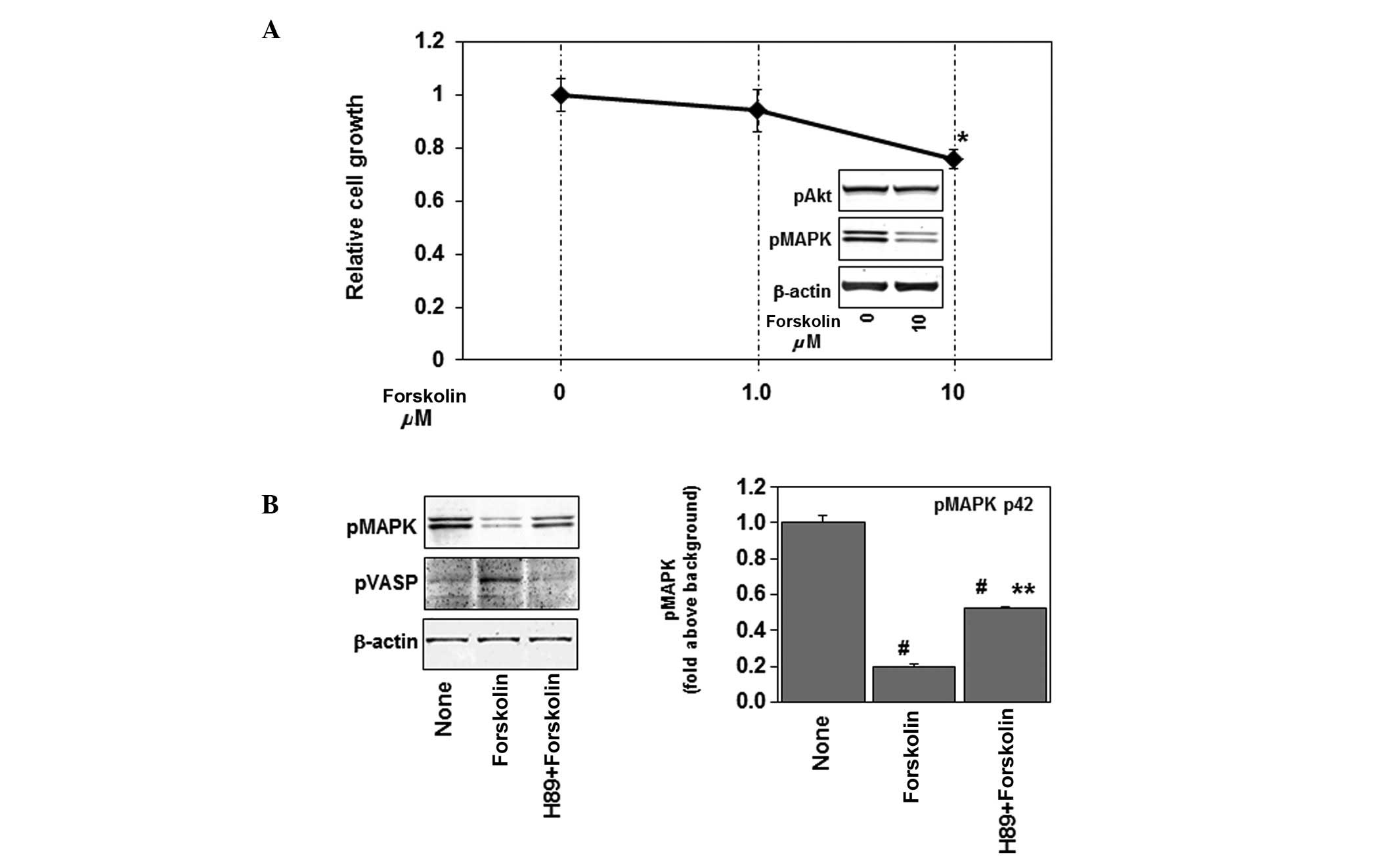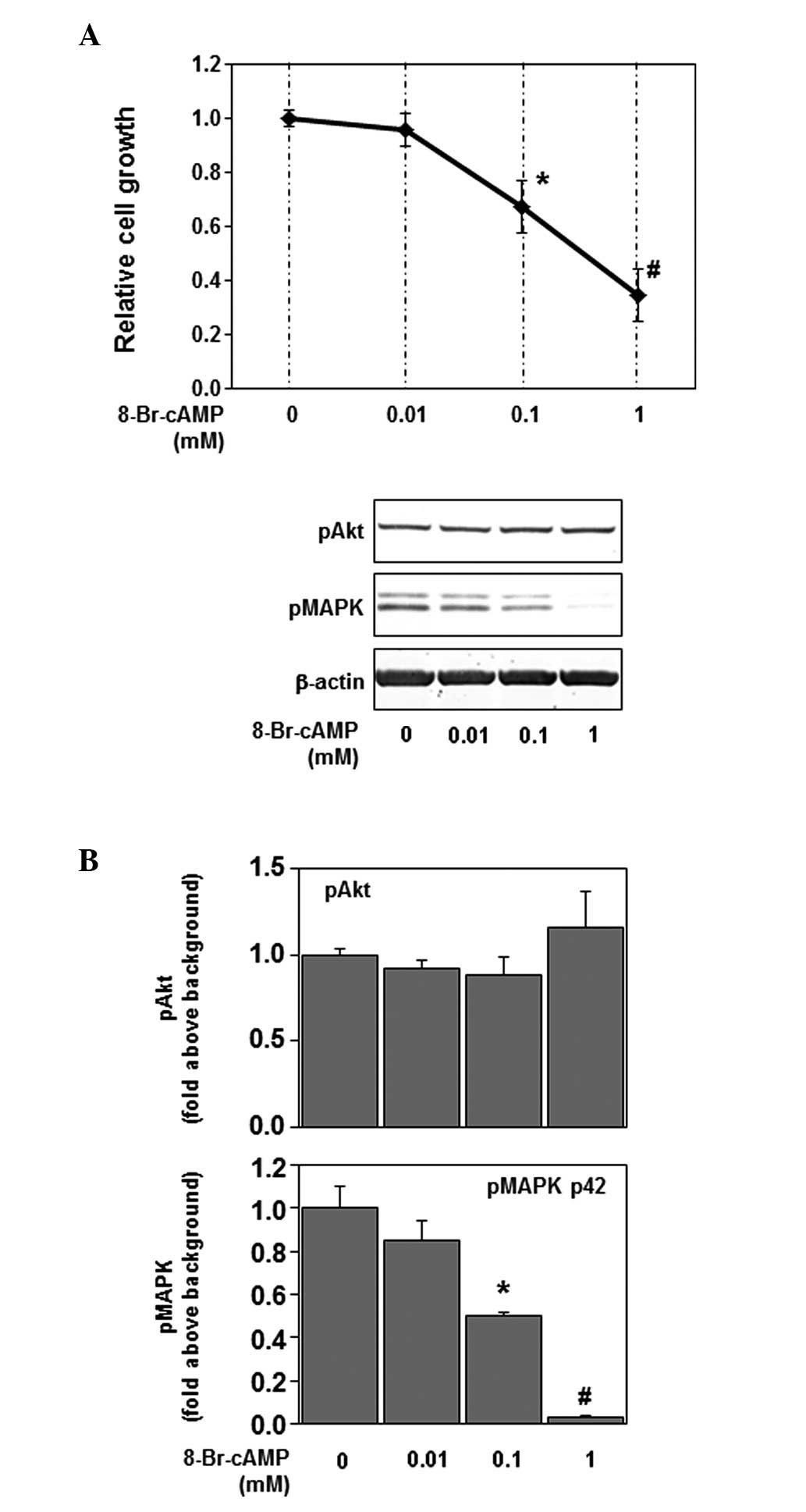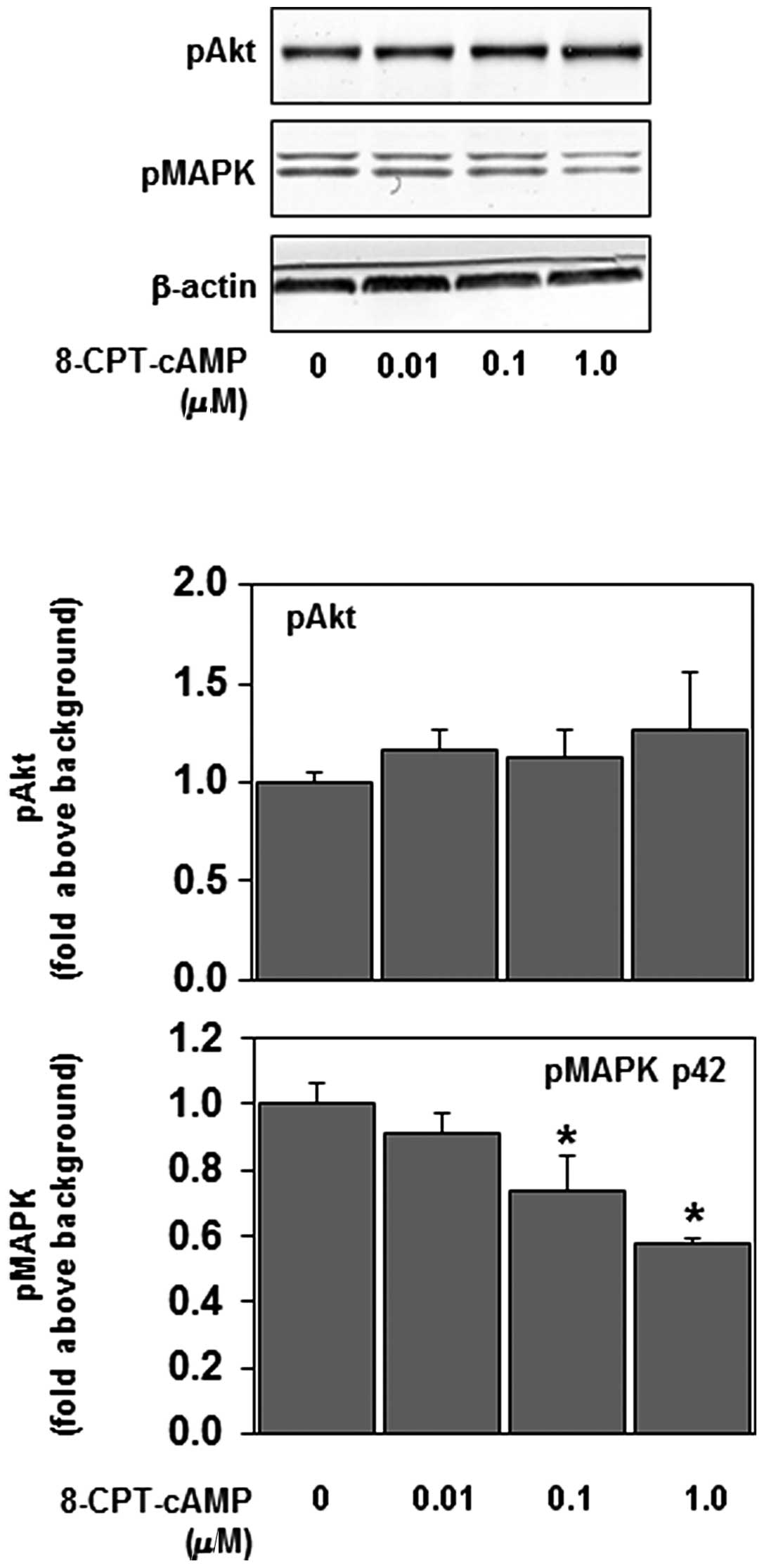|
1
|
Parsa AT and Holland EC: Cooperative
translational control of gene expression by Ras and Akt in cancer.
Trends Mol Med. 10:607–613. 2004. View Article : Google Scholar : PubMed/NCBI
|
|
2
|
McCubrey JA, Steelman LS, Abrams SL, Lee
JT, Chang F, Bertrand FE, Navolanic PM, Terrian DM, Franklin RA,
D’Assoro AB, Salisbury JL, Mazzarino MC, Stivala F and Libra M:
Roles of the RAF/MEK/ERK and PI3K/PTEN/AKT pathways in malignant
transformation and drug resistance. Adv Enzyme Regul. 46:249–279.
2006. View Article : Google Scholar : PubMed/NCBI
|
|
3
|
Hers I, Vincent EE and Tavaré JM: Akt
signalling in health and disease. Cell Signal. 23:1515–1527. 2011.
View Article : Google Scholar : PubMed/NCBI
|
|
4
|
Holland EC, Celestino J, Dai C, Schaefer
L, Sawaya RE and Fuller GN: Combined activation of Ras and Akt in
neural progenitors induces glioblastoma formation in mice. Nat
Genet. 25:55–57. 2000. View
Article : Google Scholar : PubMed/NCBI
|
|
5
|
Höland K, Salm F and Arcaro A: The
phosphoinositide 3-kinase signaling pathway as a therapeutic target
in grade IV brain tumors. Curr Cancer Drug Targets. 11:894–918.
2011.PubMed/NCBI
|
|
6
|
McCubrey JA, Steelman LS, Abrams SL,
Bertrand FE, Ludwig DE, Bäsecke J, Libra M, Stivala F, Milella M,
Tafuri A, Lunghi P, Bonati A and Martelli AM: Targeting survival
cascades induced by activation of Ras/Raf/MEK/ERK,
PI3K/PTEN/Akt/mTOR and Jak/STAT pathways for effective leukemia
therapy. Leukemia. 22:708–722. 2008. View Article : Google Scholar : PubMed/NCBI
|
|
7
|
Goldhoff P, Warrington NM, Limbrick DD Jr,
Hope A, Woerner BM, Jackson E, Perry A, Piwnica-Worms D and Rubin
JB: Targeted inhibition of cyclic AMP phosphodiesterase-4 promotes
brain tumor regression. Clin Cancer Res. 14:7717–7725. 2008.
View Article : Google Scholar : PubMed/NCBI
|
|
8
|
Brown JA, Gianino SM and Gutmann DH:
Defective cAMP generation underlies the sensitivity of CNS neurons
to neurofibromatosis-1 heterozygosity. J Neurosci. 30:5579–5589.
2010. View Article : Google Scholar : PubMed/NCBI
|
|
9
|
Warrington NM, Gianino SM, Jackson E,
Goldhoff P, Garbow JR, Piwnica-Worms D, Gutmann DH and Rubin JB:
Cyclic AMP suppression is sufficient to induce gliomagenesis in a
mouse model of neurofibromatosis-1. Cancer Res. 70:5717–5727. 2010.
View Article : Google Scholar : PubMed/NCBI
|
|
10
|
Yang L, Jackson E, Woerner BM, Perry A,
Piwnica-Worms D and Rubin JB: Blocking CXCR4-mediated cyclic AMP
suppression inhibits brain tumor growth in vivo. Cancer Res.
67:651–658. 2007. View Article : Google Scholar : PubMed/NCBI
|
|
11
|
Sengupta R, Sun T, Warrington NM and Rubin
JB: Treating brain tumors with PDE4 inhibitors. Trends Pharmacol
Sci. 32:337–344. 2011. View Article : Google Scholar : PubMed/NCBI
|
|
12
|
Moore AR and Willoughby DA: The role of
cAMP regulation in controlling inflammation. Clin Exp Immunol.
101:387–389. 1995. View Article : Google Scholar : PubMed/NCBI
|
|
13
|
Moon EY, Lee JH, Lee JW, Song JH and Pyo
S: ROS/Epac1-mediated Rap1/NF-kappaB activation is required for the
expression of BAFF in Raw264.7 murine macrophages. Cell Signal.
23:1479–1488. 2011. View Article : Google Scholar : PubMed/NCBI
|
|
14
|
Saito T, Sugimoto N, Ohta K, Shimizu T,
Ohtani K, Nakayama Y, Nakamura T, Hitomi Y, Nakamura H, Koizumi S
and Yachie A: Phosphodiesterase inhibitors suppress
Lactobacillus casei cell-wall-induced NF-κB and MAPK
activations and cell proliferation through protein kinase A - or
exchange protein activated by cAMP-dependent signal pathway. Sci
World J. 2012:7485722012.PubMed/NCBI
|
|
15
|
Sugimoto N, Miwa S, Ohno-Shosaku T,
Tsuchiya H, Hitomi Y, Nakamura H, Tomita K, Yachie A and Koizumi S:
Activation of tumor suppressor protein PTEN and induction of
apoptosis are involved in cAMP-mediated inhibition of cell number
in B92 glial cells. Neurosci Lett. 497:55–59. 2011. View Article : Google Scholar : PubMed/NCBI
|
|
16
|
Miwa S, Sugimoto N, Shirai T, Hayashi K,
Nishida H, Ohnari I, Takeuchi A, Yachie A and Tsuchiya H: Caffeine
activates tumor suppressor PTEN in sarcoma cells. Int J Oncol.
39:465–472. 2011.PubMed/NCBI
|
|
17
|
Sugimoto N, Shido O, Matsuzaki K,
Ohno-Shosaku T, Hitomi Y, Tanaka M, Sawaki T, Fujita Y, Kawanami T,
Masaki Y, Okazaki T, Nakamura H, Koizumi S, Yachie A and Umehara H:
Cellular heat acclimation regulates cell growth, cell morphology,
mitogen-activated protein kinase activation, and expression of
aquaporins in mouse fibroblast cells. Cell Physiol Biochem.
30:450–457. 2012. View Article : Google Scholar
|
|
18
|
Comerford KM, Lawrence DW, Synnestvedt K,
Levi BP and Colgan SP: Role of vasodilator-stimulated
phosphoprotein in PKA-induced changes in endothelial junctional
permeability. FASEB J. 16:583–585. 2002.PubMed/NCBI
|
|
19
|
Loza MJ, Foster S, Peters SP and Penn RB:
Beta-agonists modulate T-cell functions via direct actions on type
1 and type 2 cells. Blood. 107:2052–2060. 2006. View Article : Google Scholar : PubMed/NCBI
|
|
20
|
Moon EY, Lee GH, Lee MS, Kim HM and Lee
JW: Phosphodiesterase inhibitors control A172 human glioblastoma
cell death through cAMP-mediated activation of protein kinase A and
Epac1/Rap1 pathways. Life Sci. 90:373–380. 2012. View Article : Google Scholar : PubMed/NCBI
|
|
21
|
Enserink JM, Christensen AE, de Rooij J,
van Triest M, Schwede F, Genieser HG, Døskeland SO, Blank JL and
Bos JL: A novel Epac-specific cAMP analogue demonstrates
independent regulation of Rap1 and ERK. Nat Cell Biol. 4:901–906.
2002. View
Article : Google Scholar : PubMed/NCBI
|
|
22
|
Alloussi SH, Alkassar M, Urbschat S, Graf
N and Gärtner B: All reovirus subtypes show oncolytic potential in
primary cells of human high-grade glioma. Oncol Rep. 26:645–649.
2011.PubMed/NCBI
|
|
23
|
Tamma G, Lasorsa D, Ranieri M,
Mastrofrancesco L, Valenti G and Svelto M: Integrin signaling
modulates AQP2 trafficking via Arg-Gly-Asp (RGD) motif. Cell
Physiol Biochem. 27:739–748. 2011. View Article : Google Scholar : PubMed/NCBI
|
|
24
|
Gloerich M and Bos JL: Epac: defining a
new mechanism for cAMP action. Annu Rev Pharmacol Toxicol.
50:355–375. 2010. View Article : Google Scholar : PubMed/NCBI
|

















